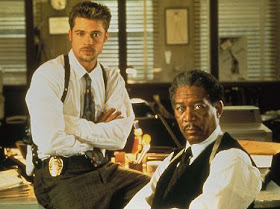 When I first became a LAMB and I saw some blogs with these "awards" festooned all over their sites, nieve me actually thought they represented physical awards, like a golden Oscar statuette. When I realized otherwise, I thought, well, okay, whatever, but I'll certainly never get one...
When I first became a LAMB and I saw some blogs with these "awards" festooned all over their sites, nieve me actually thought they represented physical awards, like a golden Oscar statuette. When I realized otherwise, I thought, well, okay, whatever, but I'll certainly never get one...
A year and a half later and my, how things change! I have the adorable Ruth from Flix Chatter
to thank for recognizing WSW with this latest blog "award," the 7X7
Link Award, which I will gladly display with pride after I fulfill the
requirements that go with this particular one. Apparently there's some
information I have to provide...
1: Tell everyone something about yourself that nobody else knows.
"Nobody" meaning my blog audience, or "nobody" meaning in life?
Sheesh, as if I don't reveal enough about myself in this blog... Okay, how's this: when I was about - oh, I dunno, six or seven, perhaps - I was walking home from school and I climbed up on the ledge of a front garden and balanced myself along it. It couldn't have been more than a foot off of the ground, but I was still a little kid and so when I inevitably fell off it and busted my ass on the concrete, it hurt like hell. I landed on my left hip and the bruise it left on my leg, on the front of my thigh, has stayed there ever since. It's down to the size of about a penny and it's the sort of thing you wouldn't notice unless I pointed it out to you. I can just barely feel it now. It's one of those bodily imperfections I've learned to live with, though it didn't scare me from perching up on ledges and walking along them. I still do it every once in awhile.
 |
- The Most Beautiful Piece. My post on the film The Way breaks with the traditional format in a particularly appropriate manner.
- The Most Helpful Piece. I like to think my guide on surviving a summer full of blockbusters was helpful.
- The Most Popular Piece. In terms of hits, that would be my Rocky Horror Picture Show post by a very wide margin. In terms of comments, that would be my piece on LAMB podcasts.
- The Most Controversial Piece. Debatable if I've ever had any truly "controversial" posts, but I suppose the closest I ever came to it was my argument for why Harry Potter and the Deathly Hallows Part 2 wouldn't get nominated for Best Picture.
- The Most Surprisingly Successful Piece. A joke post on fairy tale adaptations I'd like to see has gotten a surprisingly high amount of traffic.
- The Most Underrated Piece. I really liked my Born on the Fourth of July piece. Short and to the point.
- The Most Pride-worthy Piece. Hedwig and the Angry Inch probably best exemplifies what WSW is all about in terms of my approach to writing about movies.
3: Pass this on to 7 fellow bloggers.
Ah. The gift that keeps on giving. Well, I'm not sure who does and doesn't have one yet, so I hope no one gets any repeats...
Alex has to get one, of course. Raquelle too. And it looks like neither Page nor Becky have gotten in on this yet, so there ya go. Here's one for Brandie and her cohorts, and one for Jacqueline, and if I may be permitted to extend this outside the film blogger field, then I should like to give one to Michelle also.
There you are. Hope I did this right.







































